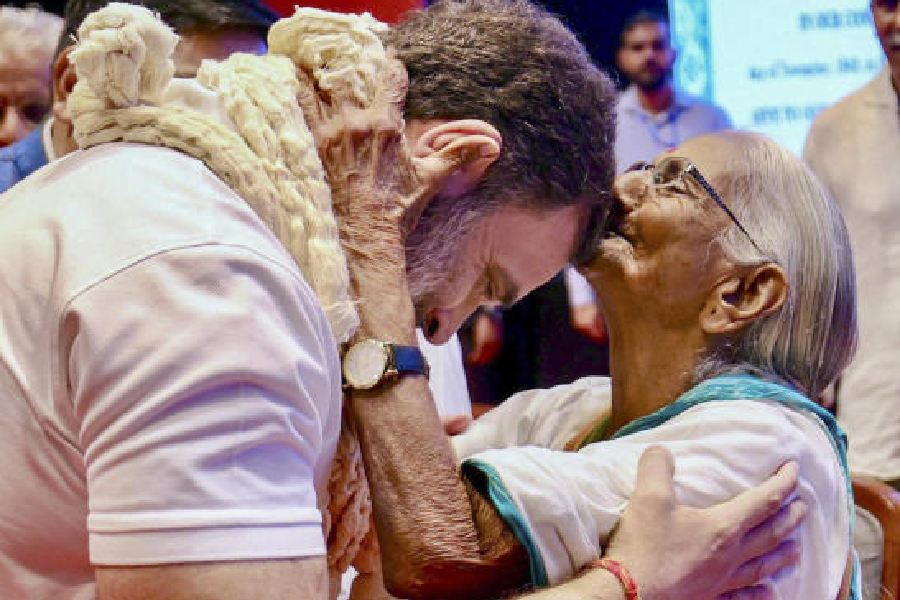Congress leader Rahul Gandhi on Wednesday criticised what he described as the monopolistic practices taking shape under Prime Minister Narendra Modi’s government, highlighting the rise of a new breed of corporate giants who he claims are using state machinery to stifle competition.
While making his case, he sought to clarify that his criticism of “monopolistic conglomerates” should not be mistaken as an attack on businesses.
In an article, New Deal for Indian Business, that has appeared in mainstream newspapers in English, Hindi, Malayalam and Marathi, Rahul was scathing as always, maintaining that the “raw fear” generated by the East India Company — which silenced India with its “chokehold” — is back.
The article drew a sharp response from the BJP. “Another baseless accusation against the Modi government through the so-called ‘match-fixing monopoly groups versus fair-play businesses’ is simply misleading. Dear baalak buddhi (immature mind), do not jump to conclusions without examining facts. Listen to what these companies have to say about the support they’ve received from PM Modi,” the party posted on X.
The BJP also posted clips of several “play-fair” business leaders named by Rahul as examples of home-grown success stories praising Modi for his support.
India Inc, too, was surprised by the ferocity of Rahul’s attack against “a new breed of monopolists” who, he claimed, had amassed “colossal wealth” and built up heft and influence by using the “machinery of the state” to quell competition.
The Congress leader had named several companies that had been able to build their businesses by playing fair. Rahul put together a fairly eclectic bunch of homegrown companies — ranging from TCS to Lenskart and PhonePe to IndiGo and Zomato — that had become hugely successful by opting to play by the rules.
Most companies chose to lie low and did not respond when asked about Rahul’s endorsement of their business practices. One official belonging to a large conglomerate, who did not wish to be named, said that the Congress leader’s accusations against monopolist groups were not new.
He said that domestic companies were investing in states ruled by the Congress and other Opposition parties, providing both direct and indirect employment.
Rahul’s comments come nearly a fortnight ahead of the Maharashtra polls where his party is in alliance with Uddhav Thackeray’s Shiv Sena (UBT) and Sharad Pawar’s NCP-SP.
Leaders in the alliance — the Maha Vikas Aghadi (MVA) — have been accusing the BJP-led Mahayuti coalition of not doing enough to court investments in greenfield projects. Many of these projects have opted to go to Gujarat.
Shiv Sena chief Uddhav Thackeray has also said that if elected to power, the MVA government will scrap the Dharavi Redevelopment Project tender being implemented by the Adani Group — which has been closely allied to the Modi government and is thought to be the target of Rahul’s vicious attack.
Unlike in his stump speeches, where Rahul has regularly named two of India’s leading business houses, no names were mentioned in The Indian Express article while referring to the monopolies.
“The government cannot be allowed to support one business at the expense of all others, much less support benami equations in the business system. Government agencies are not weapons to be used to attack and intimidate businesses. That said, I do not support that fear should be transferred from you (play-fair businesses) to the big monopolists. They are not evil individuals, but simply the outcome of the deficiencies of our societal and political environment. They should get space, and so should you.”
Of the view that the “match-fixing monopoly groups” should be called oligarchies, he argues that it is misleading to call them businesses. “When you compete with them, you’re not competing with a company, you’re fighting the machinery of the Indian state. Their core competence is not products, consumers or ideas, but their ability to control India’s governing institutions and regulators — and in surveillance. Unlike you, these groups decide what Indians read and watch, they influence how Indians think and what they speak. Today, market forces do not determine success, power relations do.”











